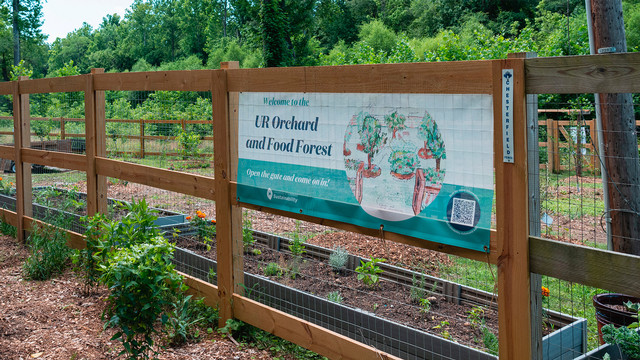University of Richmond Celebrates Grand Opening of New Orchard and Food Forest in Eco-Corridor
New edible plant demonstration site serves campus community, neighbors, and visitors.

UNIVERSITY OF RICHMOND — University of Richmond’s Eco-Corridor Orchard & Food Forest is now open to the public.
Created with support from the Oak Foundation, the Orchard and Food Forest is an edible plant demonstration site filled with a carefully curated selection of plants including apples, nectarines, medlar, pears, figs, olives, herbs, and flowers. It’s located on the campus side of the Eco-Corridor, a half-mile paved pathway running from UR Drive to River Road.
The orchard serves campus as a vibrant green space, an outdoor classroom, and a connection to the community. “The aim was to design an edible landscape that enhances biodiversity, nurtures pollinators, promotes soil health, and provides nutritious food for both students and our neighbors,” said Daniel Hart, associate director of sustainability and environmental justice.
The site was cleared with the assistance of eco-friendly goat browsing, a class participating in UR’s sustainability curriculum helped with plant selection, and staff, faculty, and student volunteers assisted with planting. Many are already using the space for coursework and research. For example, anthropology professor Miguel Díaz-Barriga and his students planted beans, squash, and corn as companion plants in a “Three Sisters” garden to study indigenous Mexican food systems.
Director of Sustainability Rob Andrejewski describes the Orchard and Food Forest as a place of belonging and learning, where all are welcome to visit, snack on fresh fruit, or take herbs home for cooking. “As we plant fruit trees, berry bushes, herbs, and perennial edibles, we’re sowing more than seeds,” he said. “We’re cultivating community: a resource-rich space where everyone can learn, harvest, share, and feel pride in the fruits of our collective labor.”
###
